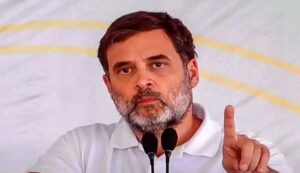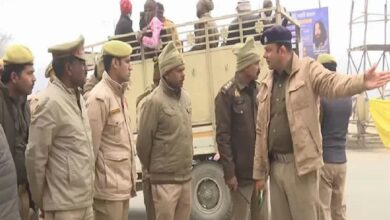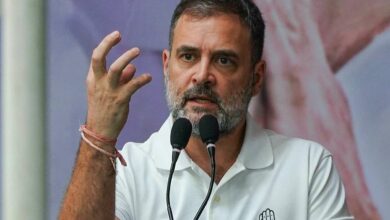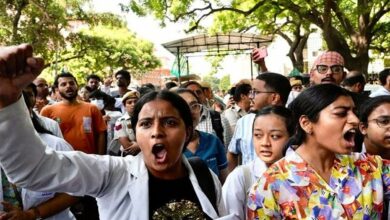Rahul Gandhi hits back at BJP leaders, accuses them of slow growth in manufacturing sector
New Delhi: During the debate on the motion of thanks to the President’s Address in the Lok Sabha and Rajya Sabha on Monday, Congress leaders Rahul Gandhi and Mallikarjun Kharge criticized the ruling coalition, while BJP members spoke about the work done by the Modi government for the nation’s capital. The Delhi assembly polls were reflected in Parliament. Elections in Delhi are scheduled for February 5.

Rahul Gandhi, the leader of the Congress, spearheaded the opposition attack in the Lok Sabha, claiming that manufacturing is an essential component of job creation and the backbone of India’s national security. He claimed that the Modi government’s ‘Make In India’ campaign had failed to revitalize it and that the manufacturing sector’s share of GDP had fallen from 15.3% in 2014 to 12.6%, the lowest level in the previous 60 years.
Members of the BJP said that frauds had plagued the Congress’s terms in power and claimed that India was rapidly improving under Prime Minister Narendra Modi’s leadership.
According to BJP leader Ravi Shankar Prasad, Sardar Vallabhbhai Patel received the Bharat Ratna in 1991 despite passing away in 1950.
With the exception of one, Sardar Vallabhbhai Patel oversaw all 550 princely kingdoms. Jawaharlal Nehru only managed one princely state, Kashmir, and PM Modi had to come to handle it. Elections are being held there today,” he said in the Lok Sabha.
According to Prasad, India’s economy was one of the worst before 2014, but under PM Modi’s capable leadership, it has grown to become the fifth-largest in the world and is on track to become the third-largest in the coming years.
“A creaky, shaky NDA coalition government” wrote the script for President Droupadi Murmu’s speech to the joint sitting of two Houses, according to Trinamool Congress leader Derek O’Brien.
“As an Indian, I am really happy to have heard the President, who is a woman. The fact that the finance minister is a woman makes me really proud as an Indian. The fact that a self-made woman started the All India Trinamool Congress 28 years ago makes me very proud. And speaking about ladies… Despite all of its rhetoric, the BJP only has 13% female MPs. In the Rajya Sabha, he said, “AITC 39%.”
According to him, women occupy 35% of cabinet seats in the Bengal administration.
To emphasize his points, the Trinamool Congress leader used Hindi movie titles and synopses from many decades. “Scripts! “The narrative of India has been greatly aided by Indian films and their scripts,” he said.
Rahul Gandhi argued for the caste census in his address, claiming that using AI to do it would open up many opportunities.
Gandhi, who spoke in great depth on the need for increasing manufacturing, mentioned China’s rivalry and said that India had an opportunity due to the energy and mobility revolution.
He said that China is at least a decade ahead of India in the fields of batteries, robotics, motors, and optics, having been working on these projects for the last 10 years.
“As the world stands on the brink of a technological and economic revolution, India needs a new vision for growth, production, and participation–one that directly addresses our two biggest challenges: the job crisis and the lack of opportunity for 90 percent of Indians,” Gandhi said in a subsequent post on X.
“Production is the source of jobs, which Make In India has not been able to resuscitate. However, the energy and mobility revolution presents us with a chance to combine these two fields via the use of renewable energy, batteries, electric motors and optics, and artificial intelligence. “To give our youth hope for the future, India must master a central role in this revolution and boost production,” he added.
“With the correct perspective, we can catch up even if China is ten years ahead. A government from India would restructure education, hire professionals, disseminate funding, and harmonize our foreign and trade policies. Our national security is based on production as well. Our reliance on Chinese goods, such as motors and batteries, puts us in danger in a world where conflicts are waged between industrial systems rather than armies,” he said.
Gandhi said that by excluding the 90%, India is combating inequity that is escalating societal tensions.
“A caste census is necessary to determine the current status of Dalits, Adivasis, OBCs, and minorities. With the use of artificial intelligence, we can then determine the best ways to guarantee that they get an equitable portion of the country’s riches and prospects. Only these two parallel tracks—production and participation—will provide India a strong development narrative and a promising future for all of our young people,” he said.
Gandhi’s speech, which criticized the government for the president’s speech, claimed that the administration had committed the same long list of crimes.
He said that electric motors, batteries, optics, and artificial intelligence (AI) are the four main technologies causing this complete shift in mobility.
Gandhi claimed to have thought about the issue, “What kind of speech would an Indian Gathbandhan government give, and how would that differ from the speech?”
“And so today I would like to lay out some dimensions of what an alternative address would look like, what the INDIA gathbandhan would probably focus on and where we would lay emphasis.”
“The inability to address the issue of unemployment is a worldwide problem that we have encountered. No! Regarding jobs, neither the UPA administration nor the current NDA government has provided Indian youth with a definitive response. No one in this room will likely disagree with me,” he remarked.
“Any nation can essentially organize two things: consumption and production. Services are the current means of organizing consumption, and manufacturing is the modern way of organizing output, but production is more than just manufacturing; for instance, agriculture is also about production.
According to him, every administration since 1990 has organized and managed consumption rather well.
“And basically, what we’ve done is give the Chinese control over the industrial organization. Therefore, despite our claims that we manufacture this mobile phone in India, it is really constructed in India, with all of its parts manufactured in China. China owns and manufactures the network that created this phone.
“So, the first thing I would say in a presidential address is that India needs to put all of its attention on production because if we don’t and instead concentrate only on consumption, we will end up with massive deficits, rising inequality, and eventually a major social problem due to unemployment, which we already have. He stated, “Everyone knows that social tension is on the rise in India if you look at the numbers of people incarcerated, the amount spent on internal security, and the amount spent on our police forces. They are all spiraling and rising.”
Gandhi said that AI is meaningless without data.
“There is one thing that is quite evident when we examine statistics nowadays. China is the owner of every single piece of data that leaves the global manufacturing system, including the data needed to create this phone, electric automobiles, and pretty much every other electronic device on the earth today. Additionally, the United States owns the consumption statistics. China owns the consumer data in China, while Google, Facebook, Instagram, and X are among the corporations that hold the data in India. Our consumption data is theirs. Therefore, India must first address the issue of what data will drive AI if it wishes to discuss the topic. And the current response is, “India does not have that data, nor does it have production or consumption data,” he said.
The head of the opposition claimed, “India has handed its consumption data to the big American companies and the production data we don’t have anyway.”.
According to Gandhi, schools should teach students about batteries, electric motors, and how these components work together. They should also teach them about the structures of drones, robots, and electric cars, as well as “how they will work together and most importantly, we have to start building a production network so that we can get access to production data.”
Mallikarjun Kharge, the leader of the opposition in the Rajya Sabha and president of the Congress, attacked the Modi government on Monday, claiming that the average GDP growth has decreased to 5.8% from 7.8% during the ten years of the UPA government led by Manmohan Singh. He also questioned how jobs will be created if the economy does not grow at the desired rate.
He said that one lakh farmers had committed suicide in the previous ten years and inquired as to whether it was “Amrit Kaal” or “Vish Kaal.””Is it ‘Vish kaal’ or ‘Amrit kaal’? Over the last ten years, one million farmers have taken their own lives. They haven’t advanced. They didn’t quadruple their salary or get MSP,” he added.
Along with expressing sympathy for the deaths in the Maha Kumbh stampede, the Congress leader said that the government was not being open about the incident’s specifics. ‘Report’ on the number of dead, he ordered.
“I would want to address the crowd at Maha Kumbh 2025…There were so many fatalities… If you disagree with my statement that a thousand people perished in the Maha Kumbh stampede, at least provide a precise count of the fatalities that occurred there,” he remarked.
Kharge criticized the administration for the rupee’s depreciation in relation to the US currency.”In 2013, when Narendra Modi was the Chief Minister of Gujarat and the UPA government was in power at the Centre, he used to say, ‘The rupee is in ICU’ and has taken a downward dive. Today, the rupee is on a ventilator; it has crossed 87.” Later, Kharge was requested to provide evidence to support his claim that hundreds of people died in the Kumbh stampede by Rajya Sabha Chairman Jagdeep Dhankhar.
He said that at the conclusion of today’s sessions, LoP ought to do so.The Leader of the Opposition should provide evidence to support Kharge’s accusations that lakhs of farmers perished, according to Parliamentary Affairs Minister Kiren Rijiju. According to Kharge, he made the comments because the administration was not providing accurate statistics.
Asaduddin Owaisi, an AIMIM MP, discussed the proposed changes to the Waqf Bill.
“I am warning and cautioning this administration that societal instability would result in this nation if a Waqf legislation is introduced and made in its current form, which would violate Articles 25, 26, and 14. The Muslim community as a whole has rejected it. There won’t be any remaining Waqf property. We want “Viksit Bharat,” and you want to build India that way. “It will be your duty to return this nation to the 1980s and early 1990s,” he said.
“Because I will not give up a single inch of my Masjid as a proud Muslim from India…My Dargah will not be lost in the slightest. I won’t permit that. We shall no longer visit and have a diplomatic discussion here. My community is pleased to be Indian, and here is the House where I must stand and speak truthfully. It was not handed to me; it is my property. I can’t have it taken away from me. For me, waqf is a kind of worship,” he said.
On Tuesday, the debate will resume in both Houses.





